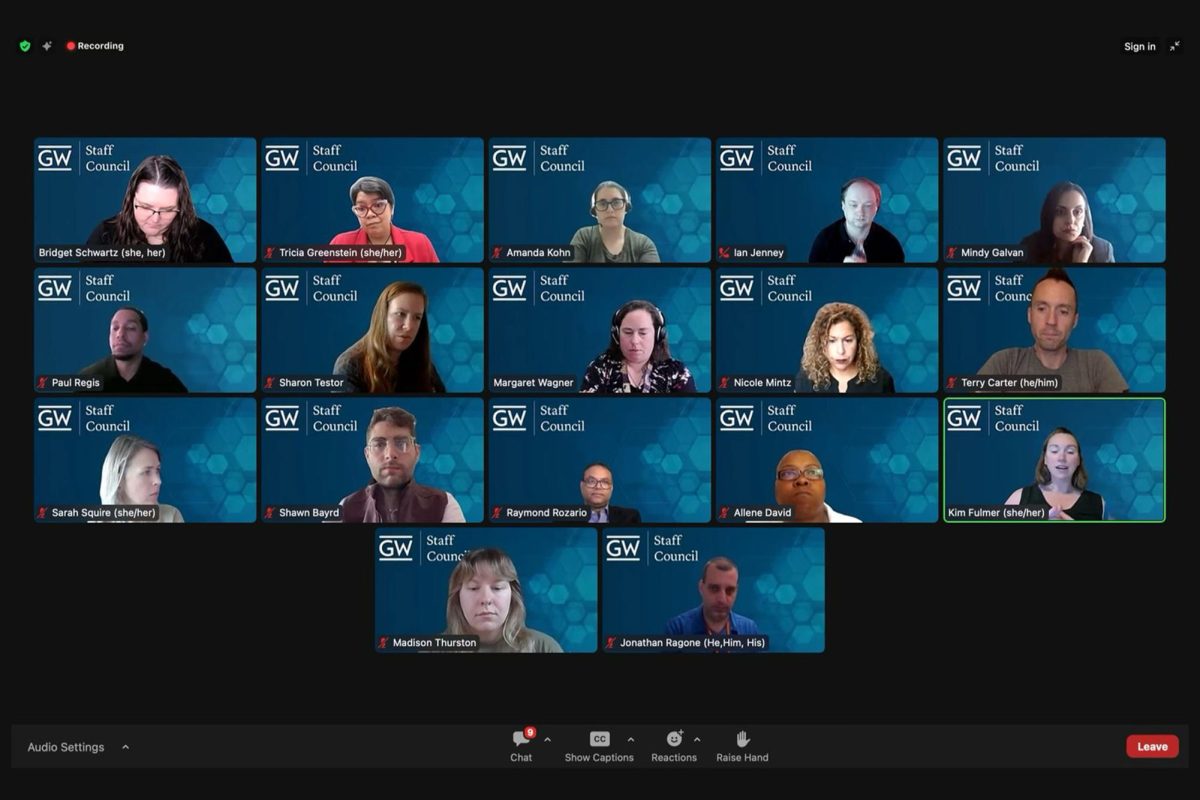Updated: Oct. 1, 2024, at 10:50 a.m.
Staff Council survey respondents said they receive low salaries and limited opportunities for professional growth in a survey discussed at a Staff Council meeting Friday.
In a Staff Council survey recently administered to the staff members on the council’s newsletter listserv, 67.6 percent of respondents said their compensation is “not sufficient” for their work and 51.9 percent of respondents believe they could find more opportunities for professional growth if they left GW. Amanda Kohn, the council’s correspondence and engagement secretary, said at the meeting that low wages have resulted in staff members claiming they need to maintain multiple jobs to ensure they can pay for their basic expenses.
Staff Council President Bridget Schwartz said between 14 and 40 percent of the staff members on the council’s listserv responded to the survey. The Staff Council has released more than half a dozen surveys throughout the year to collect information on staff experiences, which Schwartz says she takes to her conversations with the Board of Trustees, if the respondent gives her permission.
Kohn shared a presentation with the body that highlighted comments from survey respondents, including that many don’t make enough money through GW to support themselves despite their dedication to their jobs. One respondent said they have worked at GW for more than eight years and has had to seek “outside income” for their entire tenure to cover basic expenses.
“I have a second job to make up for the gaps in my salary,” one survey respondent said. “While I enjoy this job, working 40 hours a week at GW and then heading to another job is not ideal for my mental health and well-being. The cost of living, food and transportation in the DMV has continued to rise, while my salary has relatively stayed the same.”
Councilmembers voted to approve a resolution in April that requests the University increase staff wages beginning in fiscal year 2025, arguing that GW staff salaries and wages have failed to rise correspondingly with the increasing cost of living in the D.C. area.
Councilmembers did not discuss the survey result that revealed 51.9 percent of staff believe they have minimal opportunities for career growth at the University.
Schwartz said she plans to share responses and data from the survey at the Board of Trustees meeting next week.
Some councilmembers expressed concern that low survey response rates paint an inaccurate picture of staff concerns at the University.
Paul Regis, the School of Business Staff Council representative, said he strongly encourages the councilmembers to carefully evaluate and consider the fact that people tend to “jump on” the internet when they’re upset about something. He said this tendency could skew the accuracy of Staff Council surveys because the people who feel positively about the University often don’t respond.
“I worry that with such a small sample size that you’re going to have more people who are already frustrated and feeling upset about things, and they’re going to rush to the survey, whereas there possibly may be a significant portion of the population that everything’s fine, and they don’t jump on, and they don’t jump on and do the survey because they have nothing to complain about,” Regis said.
Schwartz said she will take note of concerns surrounding the low response rate but said she thinks the responses are accurate to how most staff feel at the GW, based on conversations she’s had and based on the quality of comments received.
“After over a year of hearing feedback and listening to staff, I find that this likely paints a pretty good picture of what’s happening at the University,” Schwartz said.
She said while staff left “hundreds of comments,” in the survey, councilmembers only presented the responses they had permission to share.
Michelle Fargher, who serves as the staff development and recognition committee chair, asked that the Staff Council publish the results in the next newsletter and conduct an additional survey to see if staff members feel the results are representative of the entire body. Schwartz did not respond directly to Fargher’s comment.
Staff Council Vice President Kim Fulmer discussed the upcoming Staff Council elections, which she said would last from Sept. 30 to Oct. 18, giving staff members a month to vote. Councilmembers will serve in one-year terms, from Jan. 1 to Dec. 31.
Current councilmembers are serving an 18-month term due to the revised end date of the term from July to January, which councilmembers approved in February. Fulmer said previously elected councilmembers can serve for a second term.
Fulmer added that the council is missing nominations for Development and Alumni Relations, the Milken Institute School of Public Health, Libraries and Academic Innovation, the Office of the Vice Provost for Research, the School of Nursing and the Elliott School of International Affairs.
This post has been updated to correct the following:
The Hatchet incorrectly reported that the Staff Council administered their survey to all staff members. The council sent the survey to the staff on their newsletter listserv. The Hatchet also incorrectly reported that Staff Council President Bridget Schwartz said 14 percent of all staff members responded to the survey. She said between 14 and 40 percent of staff on the listserv responded to the survey, and this number did not include executives and other individuals who aren’t covered under the Staff Council. We regret these errors.





